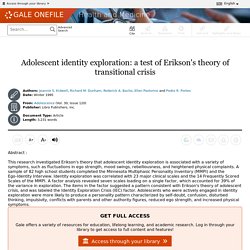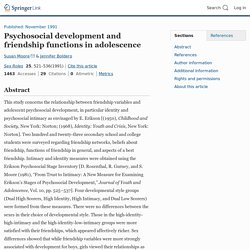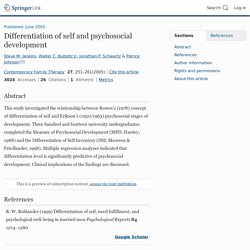

Questions relating to life's meaning and finding 'oneself' is part and parcel of the quest for fidelity and forming an integrated image of self as a unique person in the chaos of being a young adult juggling responsibilities and projecting to others from the idealist lens of adolescence.
Ethnic Identity. Identity formation. Erikson's theory on identity crisis. Slide on Adolescence. Erikson Stages of Psychosocial Development in Plain Language. Teenagers: Why Do They Rebel?
By Jeanie Lerche Davis Driving fast, breaking curfew, arguing, shoplifting.

Teenagers can push your patience, but unfortunately, some kids go as far as blatantly flouting rules or breaking the law, often with tragic results. What's with this rebellious streak? How can parents funnel it into less risky business? Teenage Rebellion Isn't What it Used to Be — Here's How to Deal. It may not seem like it when you’re in the trenches dealing with an out-of-control teenager, but pushing the boundaries is a normal part of adolescence.

Learn the causes of rebellious teen behavior and how to manage the consequences as a parent. By Kristi Pahr May 21, 2019 Once you're past the toddler stage, many parents think the worst is over. The tantrums, rule-breaking, and boundary-pushing are history and you are finally able to communicate with your child and know you're understood. How To Help My Young Adult with Identity Development. “I am most excited about the freedom that I will have when I graduate from high school.

The freedom that I am searching for is not to escape my family or anything of the sorts, but the freedom of going to a college and being myself.” - Lexie, Class of 2017, Summersville, WV Throughout their lifetime, your kids have been developing a sense of self, of identity, and self-awareness. You may have even noticed they became increasingly self-aware around puberty or around the 13-14 age range. Adolescent identity exploration: a test of Erikson's theory of transitional crisis. Abstract : This research investigated Erikson's theory that adolescent identity exploration is associated with a variety of symptoms, such as fluctuations in ego strength, mood swings, rebelliousness, and heightened physical complaints.
The study details the symptoms of adolescence such as rebellious behaviour and linked it with the Erikson's theory of identity exploration. – tarmizi001
A sample of 82 high school students completed the Minnesota Multiphasic Personality Inventory (MMPI) and the Ego-Identity Interview.

Identity exploration was correlated with 23 major clinical scales and the 14 Frequently Scored Scales of the MMPI. Psychosocial development and friendship functions in adolescence. Aries, E., & Johnson, F. (1983).

Close friendships in adulthood: Conversational content between same sex friends. Sex Roles, 7, 1183–1196. Google Scholar Berndt, T. (1982). The features and effects of friendship in early adolescence. Child Development, 53, 1447–1460. Identity Development Throughout the Lifetime: An Examination of E. Differentiation of self and psychosocial development. R.

W. Bohlander (1999) ArticleTitleDifferentiation of self, need fulfillment, and psychological well-being in married men Psychological Reports 84 1274–1280 Google Scholar M. Bowen (1976) Theory in the practice of psychotherapy P.